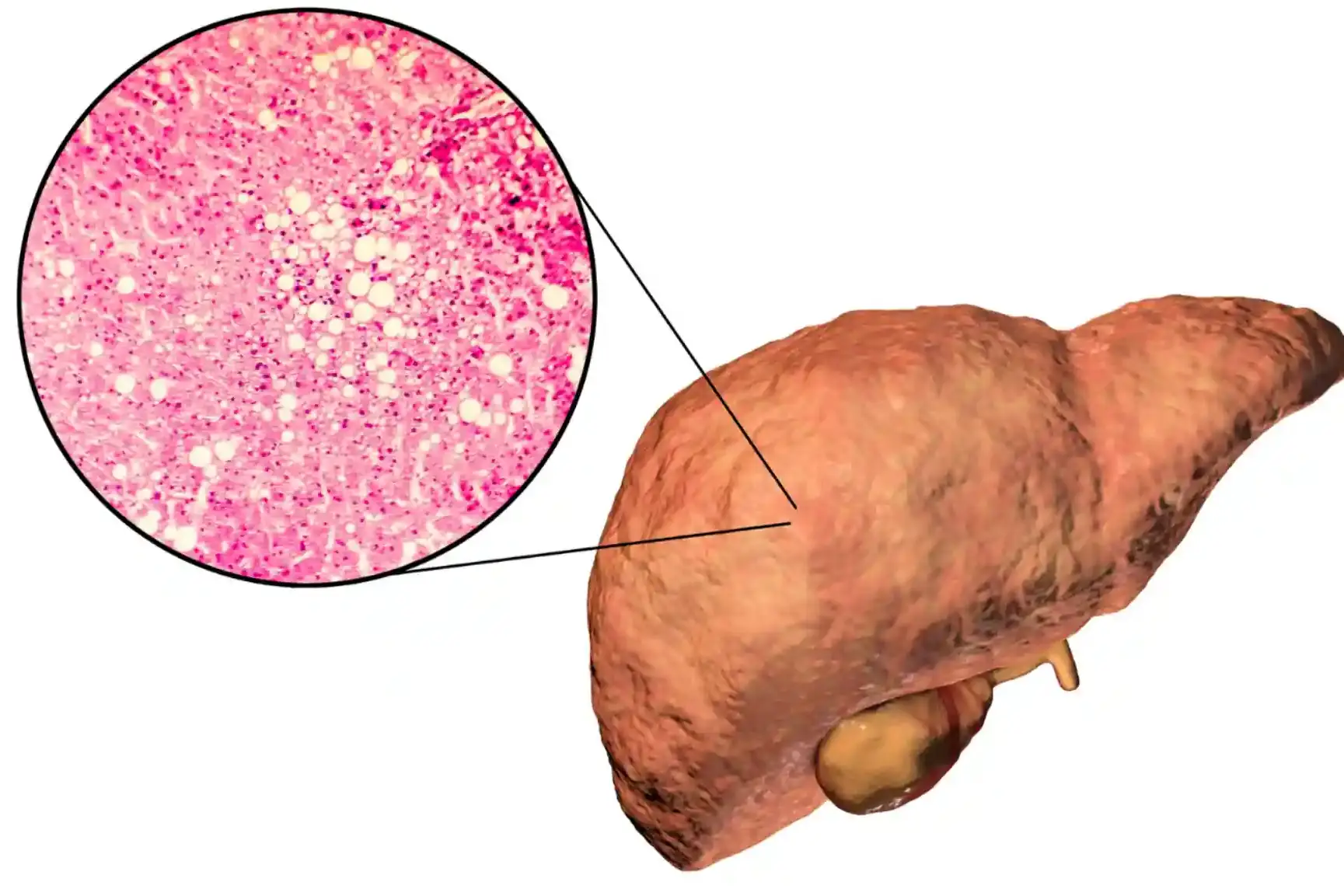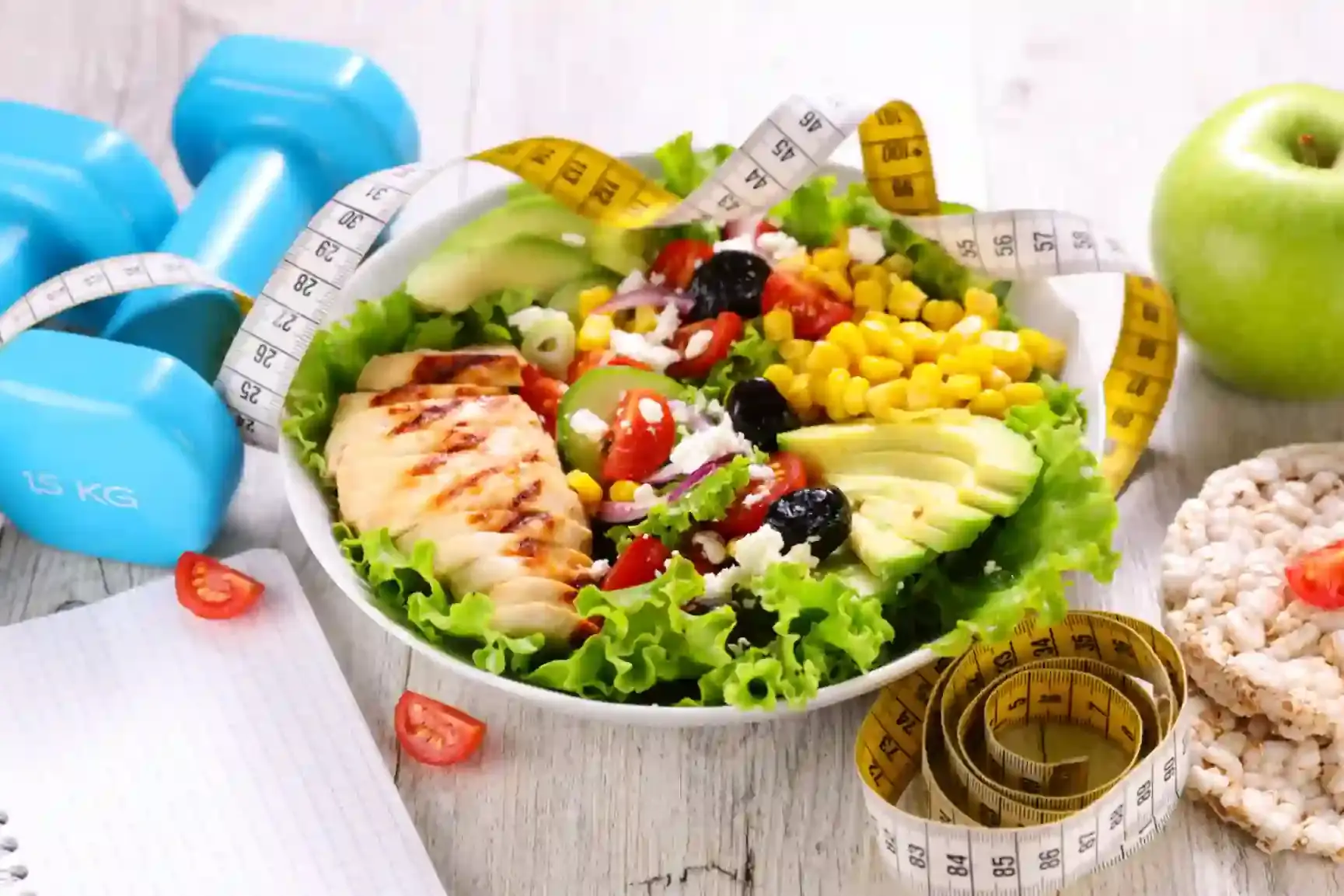Ulcerative proctitis is a type of inflammatory bowel disease (IBD) that impacts the rectum and the lower part of the colon. What you eat is key to managing symptoms and healing with ulcerative proctitis. Here, you’ll find detailed nutrition tips to improve your condition through what you eat.
Table of Contents
ToggleYou’ll learn about what ulcerative proctitis is, how to eat during flare-ups, what your body needs in calmer times, and special diets for this condition. We’ll also talk about the importance of fiber, omega-3s, and probiotics for your gut. Plus, strategies for dealing with any nutritional lacks, following the Mediterranean diet, and handling symptoms.
Understanding Ulcerative Proctitis
Ulcerative proctitis is a type of inflammatory bowel disease (IBD). It affects the rectum and the lower colon. People with this condition might experience inflammation and ulcers in these areas. While it can be hard to manage, knowing about it helps take better care of your health.
What is Ulcerative Proctitis?
This condition mainly affects the rectum and the colon’s lower end. It’s different from Crohn’s disease because it only affects these specific areas. This kind of inflammation can cause symptoms that greatly impact daily life.
Causes and Risk Factors
The causes of ulcerative proctitis are not all clear. It likely comes from a mix of family history, the environment, and the immune system. If your family has a history of IBD or you’ve been a smoker, under stress, or on a certain diet, you might have a higher risk.
Symptoms of Ulcerative Proctitis
Common symptoms include rectal bleeding, diarrhea, and abdominal pain. Feeling like you have to go to the bathroom a lot and losing weight are also signs. These symptoms can be mild or severe, and they might come and go.
Dietary Strategies for Managing Flares
Diet changes are key during ulcerative proctitis flare-ups. They can help lessen symptoms and aid in healing. Try a low residue diet. This diet is low in fiber. It stops undigested food from hurting your gut. It also cuts down on belly pain and loose stools, common flare-up signs.
Low Residue Diet
A low residue diet means eating foods that are easy on your gut. It is low in fiber. This cuts the discomfort and stops you from going to the bathroom often during a flare-up.
Avoiding Trigger Foods
Along with a low residue diet, know and avoid foods that trigger symptoms. These include fatty foods, dairy, and spicy items. Also, steer clear of fresh produce and whole grains, known to cause issues.
Incorporating Easily Digestible Foods
Eating easily digestible foods is important during flare-ups. They provide nutrients without upsetting your stomach. Think white rice, bananas, and soft, skinless vegetables.
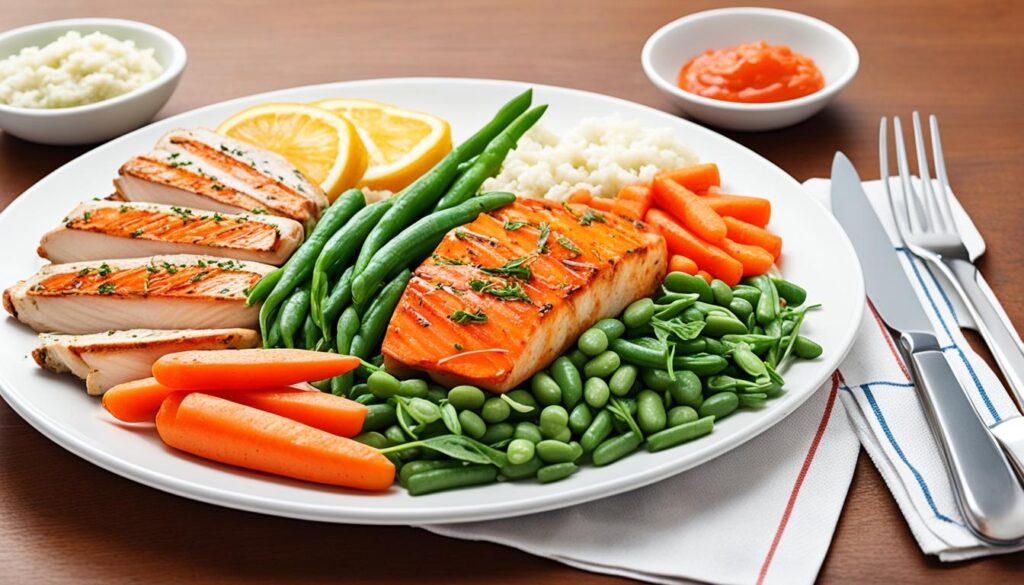
Nutritional Needs During Remission
When someone is in remission from ulcerative proctitis, a balanced diet is key. They should focus on getting the right amounts of proteins, carbs, and fats. They also need vitamins and minerals.
Balancing Macro and Micronutrients
It’s very important for those in remission to balance their nutrients. They need plenty of protein for healing and to keep their immune system strong. Complex carbohydrates help with energy and keep the gut healthy. Healthy fats reduce inflammation and improve overall health.
Vitamins and minerals are crucial for good health for these individuals. It’s important to get enough vitamin D, iron, calcium, and B vitamins. This can be a challenge because people with ulcerative proctitis often have low levels of these nutrients.
Importance of Hydration
Staying hydrated is vital for those with ulcerative proctitis in remission. Since it can cause diarrhea, there’s a risk of dehydration. To avoid this, it’s suggested to drink at least 64 ounces of fluids daily.
Hydrating well keeps electrolytes in balance. Using drinks like coconut water or sports drinks can also help. They replenish vital minerals that may be lost from diarrhea.
Ulcerative Proctitis Diet
Those with ulcerative proctitis can benefit from a diet full of nutritious, easy-to-digest foods. This helps manage symptoms, support healing, and keep the gut healthy.
Foods to Include
Try to eat these foods which are usually easy on the stomach:
- Cooked, peeled fruits and vegetables
- Lean proteins, such as chicken, fish, and tofu
- Whole grains, like brown rice and quinoa
- Healthy fats, including avocado, olive oil, and nuts
Foods to Avoid
Some foods can make your symptoms worse. Avoid these if you have ulcerative proctitis:
- High-fiber foods, including raw fruits and vegetables, whole grains, and nuts
- Dairy products, especially those high in lactose
- Spicy and fried foods
- Concentrated sweets, such as soda, candy, and baked goods
Meal Planning Tips
Planning your meals well can lower your symptoms and keep your gut healthy. Here are some tips to help:
- Eat smaller, more frequent meals to make digestion easier.
- Have probiotic foods, like yogurt, kefir, and fermented veggies, for a happy gut.
- Make meals ahead of time for quick, healthy options when you need them most.
- Drink lots of water and drinks with electrolytes, like sports drinks or coconut water, to stay hydrated.
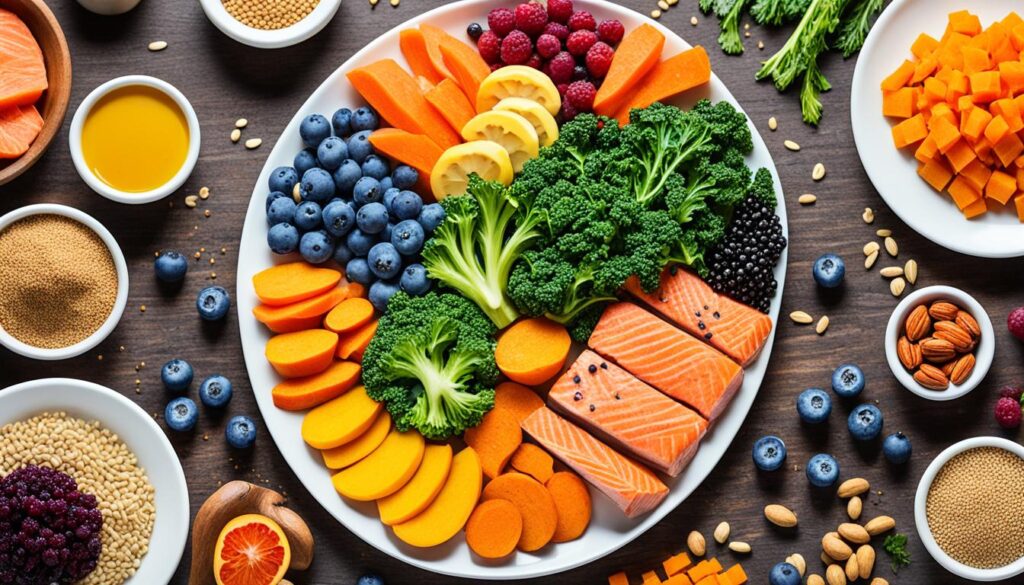
With a focused diet and smart meal planning, you can play a big role in managing your symptoms. This can enhance your overall health and life quality.
Role of Fiber in Ulcerative Proctitis
Soluble fiber is good for ulcerative proctitis. It’s in foods like oats, beans, and some fruits and vegetables. It helps by making your bowel movements regular and keeping your gut healthy. Insoluble fiber, on the other hand, found in whole grains and certain veggies, might make flare-up symptoms worse.
Benefits of Soluble Fiber
A 2015 study showed that fiber for ulcerative proctitis can help keep you in remission longer. Another study from 2003 had 22 people in remission eat 60 grams of soluble fiber daily for 3 months. None of them had stomach issues or UC flares.
In 2020, research found that a diet low in fat but high in fiber decreased inflammation. It also improved the life quality of people with mild UC or those in remission.
Potential Risks of Insoluble Fiber
Insoluble fiber for ulcerative proctitis might make things worse when you’re having a flare. It can cause bloating, gas, and stomach pain. The UK’s National Health Service recommends a low-fiber diet for easing UC symptoms during a flare-up. The Crohn’s and Colitis Foundation tells us to avoid foods high in insoluble fiber.
Always get advice from a healthcare pro or a dietitian when changing your fiber intake. They’ll help you find the best fiber balance for your health.
Omega-3 Fatty Acids and Inflammation
Omega-3 fatty acids are well-known for fighting inflammation. They might help with managing ulcerative proctitis. These good fats may lower inflammation and help with the condition’s symptoms.
Dietary Sources of Omega-3s
Eating foods rich in omega-3 is a smart move. Fish like salmon, mackerel, and sardines are top choices. They’re filled with these healthy fats. Oils from plants, such as flaxseed and walnuts, also have plenty of omega-3.
Supplementation Considerations
Your doctor might suggest omega-3 supplements for ulcerative proctitis, especially when symptoms flare. But, talk to your doctor first. Omega-3s could affect some medicines and have other side effects. Your doctor can advise on the best supplement type and amount for you.

Probiotics and Gut Health
Keeping our gut healthy is key, especially for those battling ulcerative proctitis. Foods like yogurt, kefir, and pickled veggies can boost good bacteria and cut down inflammation. Adding probiotic foods for ulcerative proctitis to your diet can balance your gut and aid digestion.
Probiotic-Rich Foods
Eating foods packed with probiotics is a great step for your gut. Here are some great picks for probiotics for ulcerative proctitis:
- Yogurt (look for live, active cultures)
- Kefir
- Fermented vegetables like sauerkraut and kimchi
- Miso soup
- Tempeh
They are all full of beneficial bacteria. This can help balance your gut, easing symptoms and cutting flare-up risks with ulcerative proctitis.
Choosing the Right Probiotic Supplements
Sometimes, your doctor might recommend probiotic supplements for ulcerative proctitis. It’s vital to pick the best supplement with your doctor. They’ll help choose the right type and amount for you.
Taking probiotics for a week to eight weeks lets the good bacteria get settled. And using them as enemas might need smaller doses but works better. This all helps your gut health and might lower ulcerative proctitis symptoms.
Nutritional Deficiencies in Ulcerative Proctitis
People with ulcerative proctitis often face nutritional deficiencies. This happens because they might not eat enough, cannot absorb nutrients well, or due to medications. It is key to watch out for and fix these common nutrient deficiencies. Doing so helps keep them healthy and manages ulcerative proctitis better.
Common Nutrient Deficiencies
There are several common nutrient deficiencies with ulcerative proctitis. Some include:
- Vitamin D – Needed for strong bones and immune health
- Iron – Important for blood cell production and avoiding anemia
- Calcium – Vital for teeth and bone strength
- B Vitamins – Key for energy and nerve health
Monitoring and Supplementation
Keeping an eye on your nutritional status is vital. Addressing shortfalls through diet changes or targeted supplementation is crucial. This strategy helps keep you healthy and cope with ulcerative proctitis. Working with your doctor or a dietitian is important. They can make sure you get what you need by pointing you in the right direction.
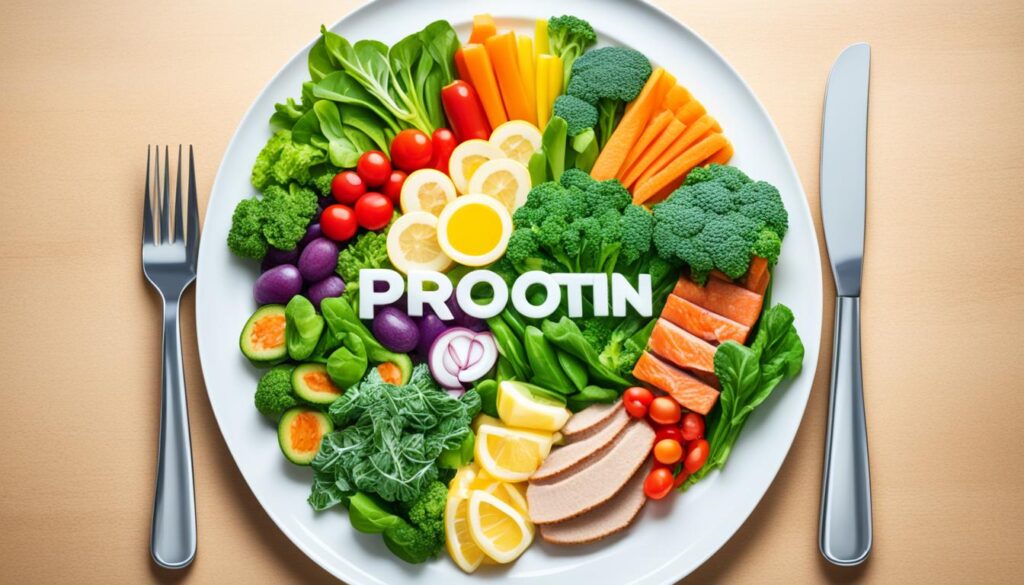
Proactively tackling nutritional deficiencies can boost your health and ease ulcerative proctitis symptoms.
The Mediterranean Diet for Ulcerative Proctitis
The Mediterranean diet is well-known for its health perks. It’s especially helpful for those with ulcerative proctitis. This diet is full of plant-based, anti-inflammatory foods. It can really help with this type of inflammatory bowel disease.
Key Components of the Mediterranean Diet
This diet focuses on eating lots of fruits, veggies, whole grains, legumes, nuts, and seeds. Such foods have loads of antioxidants, fiber, and healthy fats. Olive oil is a big part of it too. It also includes fish and poultry for protein. But, it limits red meat and processed foods. This mix is great at fighting inflammation for those with ulcerative proctitis.
Adapting the Diet for Ulcerative Proctitis
When you’re on the Mediterranean diet for ulcerative proctitis, think about what foods you can’t handle. Avoid things that might make your symptoms worse. Stick to the main points of the diet, but you might have to change some things. For example, you might need to eat less high-fiber foods when you’re not feeling well. You can slowly start eating them again when you feel better. Eating cooked and soft fruits, vegetables, along with lean proteins and the right fats, is a good idea. It can help with your symptoms and keep your gut healthy.
By making some tweaks to the Mediterranean diet for ulcerative proctitis, you can still get its anti-inflammatory benefits. But, you focus on your own nutritional needs and what your body can handle. This way of eating is a key part of taking good care of your ulcerative proctitis.
Hydration and Electrolyte Balance
Keeping well-hydrated and balanced in electrolytes is key for those with ulcerative proctitis. This is especially true when the condition flares up. Diarrhea and other gut issues can make you lose valuable fluids and electrolytes. Aim to drink at least 64 ounces of fluids every day. This can improve your gut health and lower the dehydration risk.
Importance of Staying Hydrated
Replenishing lost electrolytes, like sodium and potassium, is crucial, mostly if you have diarrhea. Drink fluids that are rich in electrolytes, such as sports drinks or coconut water. They can help re-balance your body and lessen your symptoms. It’s crucial to stay hydrated and keep your electrolytes in check during ulcerative proctitis flare-ups.
Replenishing Electrolytes
Studies show that during a flare-up, your body sends more potassium to your colon. Symptoms of a wrong electrolyte balance often involve issues with sodium, chloride, calcium, and potassium. Low sodium might make you vomit, feel weak, have diarrhea, or struggle to breathe. Without enough calcium, you could experience muscle problems and breathing difficulties. Low potassium levels might cause muscle cramps, paralysis, and weakness.
For those with ulcerative proctitis, aiming to drink 1 liter of water daily is a good idea. This condition can affect how well your colon absorbs fluids. Opt for rehydration drinks from the store, like Pedialyte or O.R.S. steered clear of soft drinks, especially sugary ones. They could make your ulcerative proctitis symptoms worse.
It’s vital to keep your body hydrated and your electrolytes in balance when managing ulcerative proctitis. By doing so, those with the condition can improve their gut health and tackle unpleasant symptoms.
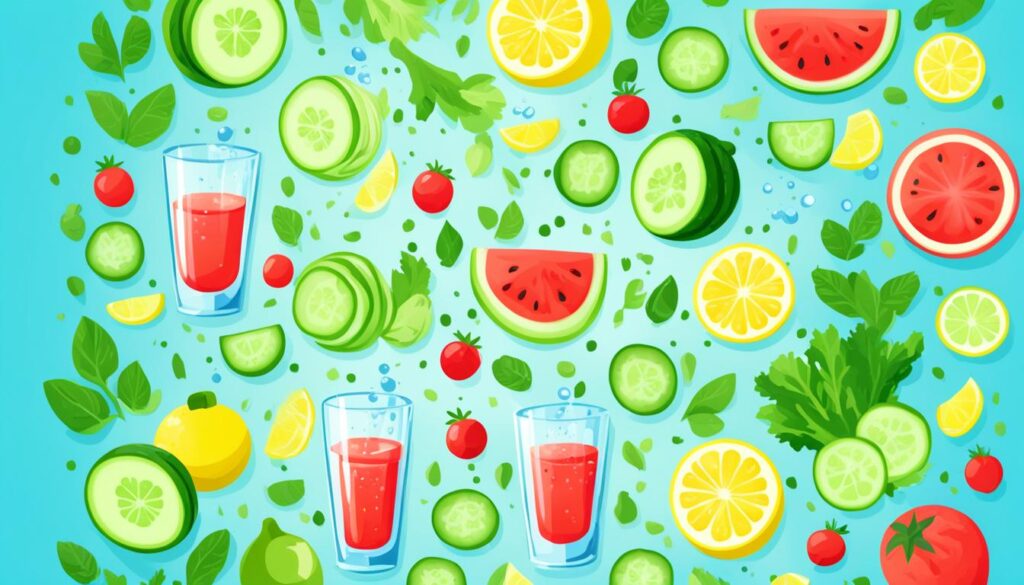
Nutritional Supplements for Ulcerative Proctitis
Some folks with ulcerative proctitis might find help in nutritional supplements. They can fix certain nutrient lacks or boost gut health. These supplements are useful for tackling the symptoms and root causes of this type of IBD.
Oral Nutritional Supplements
Oral nutritional supplements are good for those with ulcerative proctitis. These can include proteins that are easier to digest or MCTs. They give a powerful dose of important nutrients and calories. This is very helpful when someone is having a flare-up or not eating much.
Vitamin and Mineral Supplementation
People with ulcerative proctitis might also need extra vitamins and minerals. They often lack vitamin D, iron, calcium, and B vitamins. Adding these through supplements can boost health, lower the chance of problems, and maybe ease some symptoms.
Talking to your healthcare provider or a dietitian is key. They can figure out the right nutritional supplements for you. They will make sure you take them without any risks. Right use of supplements is an important part of managing ulcerative proctitis well.
Managing Symptoms Through Diet
Managing your ulcerative proctitis symptoms with diet is key. Start by finding which foods make your symptoms worse. Keep a food and symptom journal. This will show you which foods to avoid to help manage ulcerative proctitis symptoms through diet.
Identifying Personal Triggers
Track what you eat and how your body responds. This helps figure out which foods trigger your symptoms. Although it takes time, finding these trigger foods for ulcerative proctitis is crucial. It helps create a diet that lessens flare-ups and supports healing.
Gradual Reintroduction of Foods
After your symptoms calm down, slowly bring foods back with your doctor or dietitian’s guidance. This reintroducing foods for ulcerative proctitis process helps watch how your body reacts. It lets you widen your food choices safely, making sure you get all needed nutrients without causing flare-ups.

Ulcerative Proctitis Diet: Nutritional Guidelines for Managing Symptoms
The diet for ulcerative proctitis plays a big part in managing the condition. It’s crucial to eat foods that fight inflammation, support gut health, and meet your body’s specific needs. This helps control symptoms, lower flare-ups, and keeps you healthy.
It’s important to work with your healthcare team to find a diet that’s right for you. This diet should be full of anti-inflammatory items, help your gut, and meet your nutritional needs. Doing so can help manage your symptoms and keep you in remission.
By following the recommended diet and working with your healthcare team, you can make a real difference in your health. Remember, it’s all about finding a diet that works for you personally. This will support your gut health and overall well-being.
Conclusion
Managing ulcerative proctitis through diet is key to treatment. It’s important to know what foods and nutrients help. By making smart food choices, you can feel better and enjoy life more. The advice here helps create a diet that fits your health needs and eases symptoms.
Talking with your healthcare team and making changes in your diet can boost your gut health and control the disease. Staying informed about diet and ulcerative proctitis [a href=”https://www.ncbi.nlm.nih.gov/pmc/articles/PMC10284595/”]through the latest research[/a] helps you make the best food choices for your health.
Everyone’s journey with ulcerative proctitis is different. Finding the right ways to manage it might take time. Yet, with the right approach to eating, you can lessen symptoms, avoid flare-ups, and look forward to a healthy life.
FAQ
What is ulcerative proctitis?
Ulcerative proctitis is a type of inflammatory bowel disease that targets the rectum and part of the colon. It causes the inner lining of these areas to become inflamed and form ulcers.
What causes ulcerative proctitis?
There’s no one known cause for ulcerative proctitis. However, it’s thought to result from a mix of genetics, the environment, and immune system responses. People with family members who have IBD and those exposed to elements like smoking, stress, and certain foods could be more likely to get it.
What are the common symptoms of ulcerative proctitis?
The common signs of ulcerative proctitis include bleeding from the rectum, diarrhea, stomach pain, needing to use the bathroom urgently, and losing weight.
How can diet help manage ulcerative proctitis during flare-ups?
Changing your diet can help reduce symptoms and aid in healing during flare-ups. A low-residue diet, which is low in fiber, can lower stomach pain and diarrhea. It’s also crucial to dodge foods that worsen symptoms, like fatty foods, dairy, and spicy foods.
What should be the focus of the ulcerative proctitis diet during remission?
When in remission, your aim is to eat a balanced diet that keeps you healthy. This means getting enough proteins, carbs, and healthy fats, along with vitamins and minerals. Drinking plenty of water is also key to prevent dehydration from diarrhea.
What are the key considerations for the ulcerative proctitis diet?
You should concentrate on eating foods full of nutrients that are easy to digest. These might include fruits and vegetables (peeled), lean meats, grains, and good fats. But, you should steer clear of foods that can make your symptoms worse.
How does fiber affect the management of ulcerative proctitis?
Fiber can be both helpful and harmful for ulcerative proctitis. Some kinds, like those in oats, beans, and some fruits, are great for your gut health. But others, found in whole grains, might not be good during flare-ups. It’s best to focus on the good kinds first and add the others in slowly.
What is the role of omega-3 fatty acids in managing ulcerative proctitis?
Omega-3 fatty acids are known for calming inflammation, which can help with ulcerative proctitis. You can get these healthy fats from fish like salmon, and from plant sources like flaxseeds. It’s also useful to take omega-3 supplements in times of flare-ups.
How can probiotics and gut health benefit individuals with ulcerative proctitis?
Gut health is vital for managing ulcerative proctitis. Foods rich in probiotics, such as yogurt and fermented veggies, can help. Taking probiotic supplements might also improve your condition.
What are common nutritional deficiencies in individuals with ulcerative proctitis?
People with ulcerative proctitis might lack important nutrients for various reasons. They could miss out on vitamin D, iron, and B vitamins. It’s important to watch your diet and possibly take supplements to avoid these deficiencies.
How can the Mediterranean diet be beneficial for ulcerative proctitis?
The Mediterranean diet’s focus on plant-based foods and healthy fats is good for people with ulcerative proctitis. It can help lower inflammation and ease symptoms.
Why is proper hydration and electrolyte balance important for individuals with ulcerative proctitis?
Keeping hydrated and balancing your electrolytes is vital, especially when you have symptoms. Diarrhea and other issues can lead to fluid and electrolyte loss. Drinking plenty of water and maybe some electrolyte drinks can help keep your gut healthy.
How can nutritional supplements benefit individuals with ulcerative proctitis?
In some cases, using supplements can help correct any nutrient shortages and improve gut health. Your doctor or dietitian might recommend certain vitamins or minerals in supplement form for you.
How can individuals with ulcerative proctitis manage their symptoms through diet?
To manage your ulcerative proctitis through diet, figure out what foods trigger your symptoms. Then, slowly broaden your food choices under professional guidance. This will help you get all the nutrients you need while keeping your illness in check.
About The Author

Medically reviewed by Dr. Nivedita Pandey, MD, DM (Gastroenterology)
Dr. Nivedita Pandey is a U.S.-trained gastroenterologist and hepatologist with extensive experience in diagnosing and treating liver diseases and gastrointestinal disorders. She specializes in liver enzyme abnormalities, fatty liver disease, hepatitis, cirrhosis, and digestive health.
All content is reviewed for medical accuracy and aligned with current clinical guidelines.




